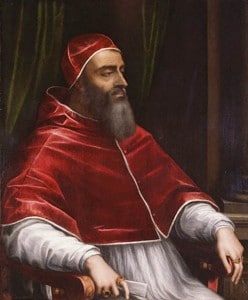 On this day in history, 5th January 1531, Pope Clement VII wrote to Henry VIII forbidding him to remarry, and threatening him with excommunication if he took matters into his own hands and disobeyed Rome:
On this day in history, 5th January 1531, Pope Clement VII wrote to Henry VIII forbidding him to remarry, and threatening him with excommunication if he took matters into his own hands and disobeyed Rome:
“At the request of the Queen, forbids Henry to remarry until the decision of the case, and declares that if he does all issue will be illegitimate. Forbids any one in England, of ecclesiastical or secular dignity, universities, parliaments, courts of law, &c., to make any decision in an affair the judgment of which is reserved for the Holy See. The whole under pain of excommunication. As Henry would not receive a former citation, this is to be affixed to the church gates of Bruges, Tournay, and other towns in the Low Countries, which will be sufficient promulgation. Rome, 5 Jan. 1531.” (LP v.27)
Henry VIII sought an annulment of his marriage to Catherine of Aragon so that he could marry his new love, Anne Boleyn. He applied for a dispensation to marry again back in August 1527, never dreaming that it would take nearly six years to get the marriage annulled. A seemingly simple request for a dispensation turned into “The King’s Great Matter”, and resulted in the fall of Cardinal Wolsey, England breaking with Rome, Henry declaring himself to be “sole protector and supreme head of the English church and clergy”, and the executions of men like Thomas More, John Fisher and the Carthusian monks, who would not swear the oath of supremacy.
Henry VIII finally married Anne Boleyn in a secret ceremony on 25th January 1533, and their marriage was declared valid on 28th May 1533, just days before Anne’s coronation on the 1st June. See my article A Timeline of Anne Boleyn’s Relationship with Henry VIII – From 1528-1533 for more information on Anne Boleyn and Henry VIII’s relationship.
(Taken from “On This Day in Tudor History” by Claire Ridgway)